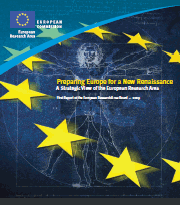|
|
|
|
|
|
|
News & Views item - October 2009 |
![]() European Research Area Board Urges EU to Raise R&D Spending to 5% of GDP by
2030. (October 17, 2009)
European Research Area Board Urges EU to Raise R&D Spending to 5% of GDP by
2030. (October 17, 2009)
 The
European Commission's European Research Area Board (ERAB) in its thirty page
report,
Preparing Europe for a New Renaissance
The
European Commission's European Research Area Board (ERAB) in its thirty page
report,
Preparing Europe for a New Renaissance![]() ,
calls for a renaissance in research and development (R&D) spending among
the nations of the European Union (EU).
,
calls for a renaissance in research and development (R&D) spending among
the nations of the European Union (EU).
In addition to urging EU nations to boost R&D spending to 5% of gross domestic product (GDP) by 2030 ERAB recommends there be a tripling of spending on higher education.
Janez Potočnik, the EU's Commissioner for Science and Research said: "I warmly welcome this first ERAB annual report, which provides a clear vision of what the European Research Area should aspire to . Its recommendations, some of which have already found their way into President Barroso’s political guidelines for the next Commission, will stimulate new discussions on how to address the challenges facing European research and usher in a new ‘Renaissance’. This Strategic View fully vindicates the trust I have placed in ERAB to advise me and the Commission on how we can facilitate the development of a true European Research Area."
The Board's media release states:
In its first annual report, ERAB lays out a broad view of what is needed to accomplish a new "Renaissance" in European research. Based on the key challenges facing mankind today... it identifies six main areas in which it considers action must be taken:
the creation of a united ERA [European Research Area]
the solution of our Grand Challenges (climate change, energy supply, ageing societies, etc.)
the interaction of science and society
the collaboration of public and private sectors in open innovation
the encouragement of excellence, and
the promotion of cohesion
ERAB also highlights the need for an independent voice of research ultimately linked into the political process, and, amongst other tasks, gives independent advice,. This recommendation was recently echoed by Commission President Barroso who announced the creation of a Chief Scientific Officer who “has the power to deliver proactive, scientific advice throughout all stages of policy development and delivery.”
Moreover ERAB stresses the need to restore trust between science and society, with a new social contract based on the ‘3 Rs’ : " R igour in decision making, political or scientific; R espect for our fellow man, scientist and environment and R esponsibility for our own actions as scientist and citizens".
Finally, the report sets milestones by which to measure progress in the years ahead. Over the coming months, ERAB will be elaborating on these six points in its research, communications and meetings with key stakeholders of the ERA.
Background
ERAB... was created by the Commission in 2008 with the aim to provide independent and authoritative advice to the European Commission on European research and science policy, whose objective is to realise a European Research Area.
ERAB’s main tasks are:
to advise the Commission on the realisation of a European Research Area;
to deliver opinions on the realisation of a European Research Area at the request of the Commission or on the Board's own initiative;
to provide the Commission with an annual report on the current state of the European Research Area.
ERAB consists of 22 high-level professionals* from the fields of science, academia and business, appointed in a personal capacity for terms of office lasting four years.
_______________________________________________
* Dr. Reinhold ACHATZ , Corporate Vice President, Siemens AG, Corporate Technology, Corporate Research and Technologies (DE)
Dr. Robert AYMAR , Former Director General of the European Organization for Nuclear Research (CERN)(CH); Scientific Counsellor to the Administrator of CEA (FR)
Dr. Lajos BALINT , Director of International Relations, National Information Infrastructure Development Institute (HU)
Dr. Jean J BOTTI , Chief Technical Officer, EADS (DE)
Dr. Adelheid EHMKE , President, European Platform of Women Scientists EPWS (BE)
Prof. Frank GANNON , Director General, Science Foundation Ireland (IRL)
Dr. Barbara HAERING , Chief Executive Officer, ECONCEPT Inc. (CH)
Prof. Sir David KING , Founding Director, Smith School of Enterprise and the Environment - University of Oxford (UK)
Dr. Leif KJAERGAARD , President of LEIF and FOOD SCIENCE, former Chief Technology Officer of Danisco A/S, (DK)
Prof. Marja MAKAROW , University of Helsinki (FI), and Chief Executive, European Science Foundation (FR)
Prof. Karol MUSIOL , Rector, Jagiellonian University, Krakow (PL)
Prof. Zaneta OZOLINA , Faculty of Social Sciences, University of Latvia (LV)
Prof. Maria Cristina PEDICCHIO , Faculty of Sciences, Università di Trieste and President, Cluster in Biomedicine (CBM) (IT)
Prof. Alain POMPIDOU , Centre National de la Recherche Scientifique (CNRS) (FR)
Prof. Carlos Maria ROMEO-CASABONA , Director, Inter-University Chair in Law and the Human Genome, University of Deusto and University of the Basque Country (ES)
Dr. Unni STEINSMO , President, Chief Executive Officer, SINTEF (NO)
Prof. Lena Treschow TORELL , President, Royal Swedish Academy of Engineering Sciences (SE)
Dr. Jan VAN DEN BIESEN , Vice-president Public R&D Programs, Philips Research (NL)
Prof. Georg WINCKLER , Rector, University of Vienna, former President, European University Association (AT)
Prof. John WOOD , Imperial College London (UK)
Dr. Ingrid WÜNNING TSCHOL , Head of Science and Research, Robert Bosch Stiftung (DE)
Prof. Nüket YETIS , President, Scientific and Technological Research Council of Turkey (TR)